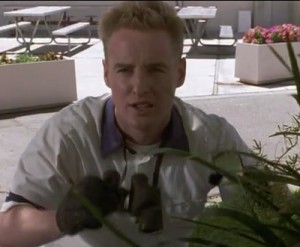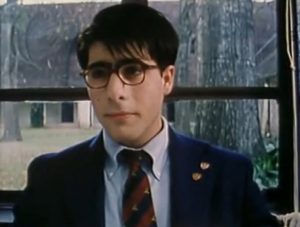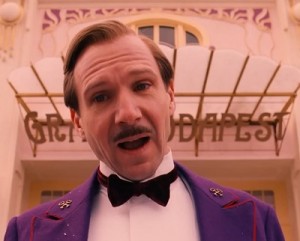M. Gustave (Ralph Fiennes); the impeccable, refined, and deeply sketchy hero of The Grand Budapest Hotel; is the kind of character who made me fall for Wes Anderson films: men with a flair for self-creation so extreme that I can’t help rooting for them because my own imagination, by comparison, seems embryonic.
In my favorite of Anderson’s films, Bottle Rocket, the hero is Dignan (Owen Wilson), whose first steps in a 50-year plan of becoming a criminal mastermind involve stealing from friends’ houses for practice, moving on to a bookstore heist wearing nose tape, and then promptly going on the lam. No unimportant detail escapes Dignan’s dedication to this persona: note the binoculars he uses when springing his friend Anthony (Luke Wilson) from a voluntary stay at a mental health facility.
“Look how excited he is,” says Anthony when his doctor protests the sheets hanging from the window. “I gotta do it this way…I have to climb out. It’s so important to him.” Dignan’s enthusiasm is so contagious that Anthony continues to go along with his buddy’s increasingly ill-conceived plans just because he can’t bear to deflate him. And when you hear Dignan’s prattle and see that grin, you can’t blame him. (Admittedly, I think Owen Wilson, who co-wrote the film, largely responsible for the success of this character; his considerable charm made even the overrated Midnight in Paris palatable.)
And, of course, there’s Max Fischer (Jason Schwartzman) in Rushmore, who puts more energy into his school activities than the rest of the student body combined. As Anthony Lane put it, “To say [Max] attends Rushmore is like saying the Holy Father hangs out at the Vatican: Rushmore could exist without Max, but there would be no point to the place.”
In the newest Anderson installment, M. Gustave’s considers the care of his establishment, guests, and the new bell boy of paramount importance. He is the platonic version of a hotel concierge, a fussy perfectionist so accommodating he knows guests’ wishes in advance, and he’ll go to absurd (and disturbing) lengths to satisfy them. But unlike with most of Anderson’s heroes, M. Gustave’s refined veneer slips regularly in The Grand Budapest Hotel. In difficult situations, coarse language breaks through the stylized version of himself he’s created, and these curious, funny instances cause viewers to wonder just who this guy is.
That’s probably why the film reminded me of Cary Grant’s classic comment about the style and sophistication that became synonymous with his name: “Everyone wants to be Cary Grant. Even I want to be Cary Grant.” Because of course, he wasn’t. Born Archibald Leach in Bristol, England, Cary Grant was poor, largely abandoned by his family, and making a living as a juggler/acrobat by his early teens. Not exactly the pedigree we all might expect given his dashing presence on the screen.
I think what I love so much about Anderson’s heroes—his Gustaves, Maxes, and Dignans—is also what I admire most about Grant: not only do these heroes envision an impossibly large, glorious version of themselves, but they also manage, despite the many obstacles Anderson—and life—stacks up against them, to pull it off.



